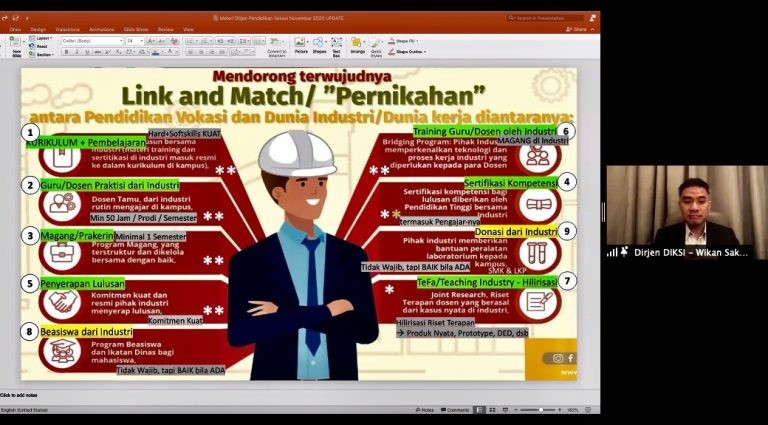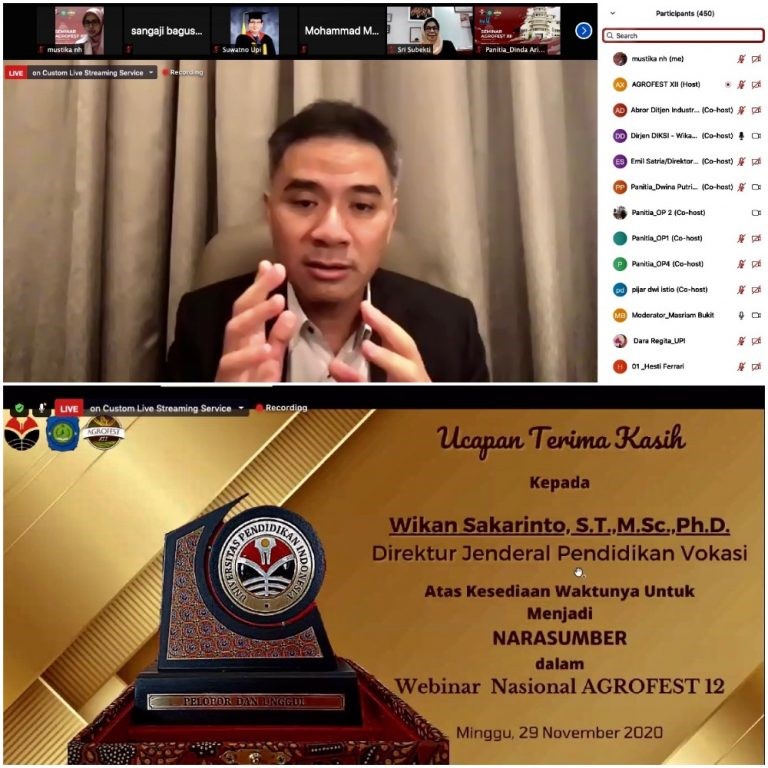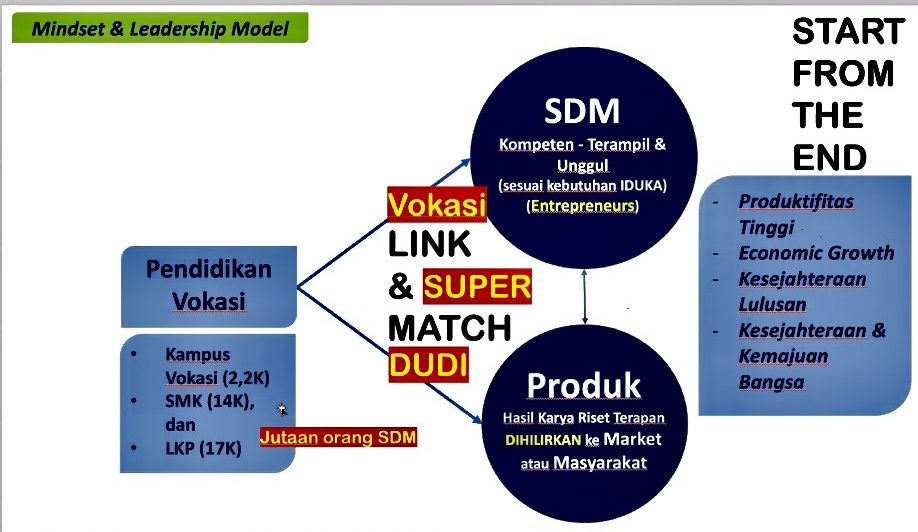
Start at the end. This mindset needs to be built in vocational education according to Wikan Sakarinto, M.Sc., Ph.D., Director General of Vocational Education (Dirjen Diksi) of the Ministry of Education and Culture in the AGROFEST (Agroindustry for Science, Education & Technology) webinar organized by HIMAGRIN, Agro-industrial Technology Education Study Program on Sunday, 29 November 2020.
Directorate General of Vocational Education, which includes the Directorate of Vocational and Professional Higher Education (Polytechnics, Higher Education, Institutions that have vocational study programs – D1, D2, D3, D4, S2T, S3T), Directorate of Vocational High Schools, Directorate of courses and training, was not born only to distribute grants or licenses to study programs or only issue certificates. Vocational education has two main objectives, 1) producing competent, skilled, and superior human resources in accordance with the needs of IDUKA (industry and the world of work); 2) produce tangible products from the results of applied research, which are released to the market or society. It starts over”.
According to the Director-General of Vocational Education, HR competence is not just hard skills but also related to soft skills and character aspects. The following are the complaints of labor users against college graduates, namely: 1) less resistant to pressure from the world of work; 2) less able to work together as a team; 3) lack of initiative and easily get bored; 4) have not been able to communicate well both orally and in writing. However, that does not mean that hard skills are not important. The GPA as a student’s cumulative average score must be relatively high (reaching 3 points slightly) in order to be netted in the labor selection interview process.
In the AGROFEST webinar guided by Prof. Dr. Masriam Bukit, the Director-General of Vocational Education explained that the link and match policy or “marriage” is a strategy to achieve two main goals of vocational education, namely producing competent human resources and producing real products.
In the national AGROFEST webinar, which was attended by more than 400 participants (students, vocational teachers, lecturers from various institutions in Indonesia), Wikan explained that the characteristics were interrelated and were in accordance with the targets that became the outputs & outcomes of vocational education. These characteristics include: 1) competent and skilled graduates so that they are ready to work or continue their studies or become strong entrepreneurs; 2) adaptive, agile, flexible curriculum; 3) project-based learning from the industry; 4) applied research; 5) teaching factory/industry.
These competent graduates must have hard skills competencies (relatively high GPA, competency certificates), soft skills (communication, problem-solving, critical thinking, leadership, presentation of English skills, creativity), integrity (honest, hard work, sincere gratitude, inspiration, Love Indonesia). All these competencies must be accommodated by the curriculum.
Project-based learning (PjBL) from industry is a challenge because there are still misconceptions about project understanding where the project in question is not just making a product in practice and then discarding it, but a project that is valuable according to industry needs. It is an implementation of the starting-over mindset. Students are given stimulation or facilitated in order to communicate, cooperate with industry to carry out a project that is done together in a team for a certain period of time with the guidance of several lecturers. The success of the project is judged by the industry. It is also an example of implementing an adaptive, agile, and flexible curriculum.
PjBL can be an ecosystem for applied research and teaching factory/industry. Research in vocational education must start from the final mindset, not only for publishing articles, promotions, accreditation of study programs, and so on. Research must produce tangible products that are beneficial to society or industry so that before conducting research, it is necessary to determine the type of research/product needed and which industry/party will use the results of the research so that the research product is feasible to obtain sold and worthy of the journal.
Teaching factory/industry does not mean that campuses make mass products to be sold in the market and compete with other products on the market. According to Wikan, campuses will find it difficult to compete with industry. The campus must produce prototypes, IPRs, patents that can be mass-produced by industry.
Regarding agro-industry, the Directorate General of Vocational Education is quite focused on the agro/agricultural sector. In 2021, agricultural aspects especially applied technology for the development of agricultural productivity and processing of agricultural products, will become a top priority in the policy of the Director-General of Vocational Education.
At the AGROFEST national webinar, which was also attended by UPI leaders, FPTK leaders and department heads, heads of study programs at FPTK, Wikan again emphasized the importance of the start from end mindset. “For example, a campus that produces teachers or lecturers then produces graduates who will become teachers or lecturers who have a start from the final mindset, namely teachers who can produce competent human resources (SMK graduates) and produce tangible products. HR competence, he said in a poem:
habis kehujanan kita dipanggil,
datang pun dengan menggigil,
untuk sukses tak cukup dengan hard skills,
tapi karakter dan juga soft skills.


